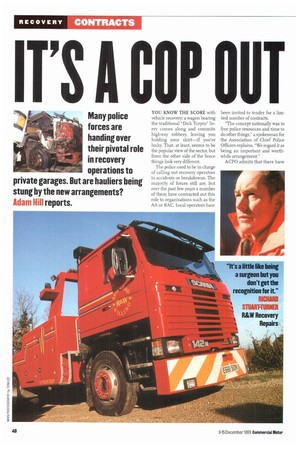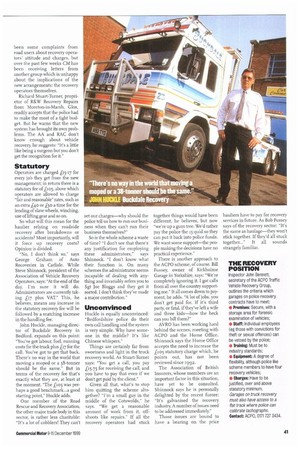T'S A C OP
Page 42

Page 43

If you've noticed an error in this article please click here to report it so we can fix it.
Many police forces are handing over their pivotal role in recovery operations to private garages. But are hauliers being stung by the new arrangements? Adam Hill reports.
YOU KNOW THE SCORE with vehicle recovery: a wagon bearing the traditional "Dick Turpin" livery comes along and commits highway robbery, leaving you holding your shirt—if you're lucky. That, at least, seems to be the popular view of the sector, but from the other side of the fence things look very different.
The police used to be in charge of calling out recovery operators to accidents or breakdowns. The majority of forces still are, but over the past few years a number of them have contracted out this role to organisations such as the AA or RAC. Local operators have been invited to tender for a limited number of contracts.
"The concept nationally was to free police resources and time to do other things," a spokesman for the Association of Chief Police Officers explains. "We regard it as being an important and worthwhile arrangement" ACP° admits that there have been some complaints from road users about recovery opera. tors' attitude and charges, but over the past few weeks CM has been receiving letters from another group which is unhappy about the implications of the new arrangements: the recovery operators themselves.
Richard Stuart-Turner proprietor of R&W Recovery Repairs from Moreton-in-Marsh, Glos, readily accepts that the police had to make the most of a tight budget, But he warns that the new system has brought its own problems. The AA and RAC don't know enough about vehicle recovery, he suggests: "It's a little like being a surgeon but you don't get the recognition for it."
Statutory Operators are charged £15-17 for every job they get from the new management; in return there is a statutory fee of Do5, above which operators are allowed to charge "fair and reasonable" rates, such as an extra £40 or iso a time for the lending of slave wheels, winching, use of lifting gear and so on.
So what will this mean for the haulier relying on roadside recovery after breakdowns or accidents? Most importantly, will it force up recovery costs? Opinion is divided.
"No, I don't think so," says George Graham of Auto Recoveries in Carlisle. While Steve Shinnock, president of the Association of Vehicle Recovery Operators, says: "At the end of the day, I'm sure it will do. Administrators are currently taking £17 plus VAT" This, he believes, means any increase in the statutory recovery fee will be followed by a matching increase in the handling fee.
John Huckle, managing director of Buckdale Recovery in Bedford, expands on this point: "You've got labour, fuel, running costs for the truck plus £17 for the call. You've got to get that back. There's no way in the world that moving a moped or a 38-tonner should be the same." But in terms of the recovery fee that's exactly what they are, at least at the moment. "The Lio5 was perhaps a good benchmark. ..a good starting point," Huckle adds.
One member of the Road Rescue and Recovery Association, the other major trade body in this sector, is rather less charitable: "It's a lot of cobblers! They can't set our charges—why should the police tell us how to run our business when they can't run their business themselves?"
So is the whole scheme a waste of time? "I don't see that there's any justification for employing these administrators," says Shinnock. "I don't know what their function is. On many schemes the administrator seems incapable of dealing with anything and invariably refers you to Sgt Joe Bloggs and they get it sorted. I don't think they've made a major contribution."
Unconvinced
Hu ckle is equally unconvinced: "Bedfordshire police do their own call handling and the system is very simple. Why have someone in the middle? It's like Chinese whispers."
Things are certainly far from sweetness and light in the truck recovery world. As Stuart-Turner says: "You get a call, you pay L'15.75 for receiving the call, and you have to pay that even if we don't get paid by the client."
Given all that, what's to stop him quitting the scheme altogether? "I'm a small guy in the middle of the Cotswolds," he says. "We get a reasonable amount of work from it, offshoots like repairs." If all the recovery operators had stuck together things would have been different, he believes, but now "we're up a gum tree. We'd rather pay the police the 15 quid so they can put it back into police funds. We want some support—the people making the decisions have no practical experience."
There is another approach to the ACP° scheme, of course. Bill Fussey, owner of Kirkholme Garage in Yorkshire, says: "We're completely ignoring it. I got calls from all over the country supporting me." It all comes down to payment, he adds. "A lot of jobs, you don't get paid for If it's third party, or fatal, if they've left a wife and three kids—how the heck can you bill them?"
AVRO has been working hard behind the scenes, meeting with ACPO and the Home Office. Shinnock says the Home Office accepts the need to increase the L103 statutory charge which, he points out, has not been reviewed since 1992.
The Association of British Insurers, whose members are an important factor in this situation, have yet to be consulted. Shinnock says he is personally delighted by the recent furore: "It's galvanised the recovery industry. A number of issues need to be addressed immediately."
Those issues are bound to have a bearing on the price hauliers have to pay for recovery services in future. As Bob Fussey says of the recovery sector: "It's the same as haulage—they won't stick together. If they'd all stuck together..." It all sounds strangely familiar.
THE RECOVERY POSITION
Inspector John Bennett, secretary of the ACP° Traffic Vehicle Recovery Group, outlines the criteria which garages on police recovery contracts have to meet: • Premises: Secure, with a storage area for forensic examination of vehicles; • Staff: Individual employees (eg those with convictions for theft or sexual offences) can be vetoed by the police; • Training: Must be to industry standards; • Equipment: A degree of flexibility, although police like scheme members to have four recovery vehicles; • Charges: Have to be justified, over and above statutory minimum.
Garages on truck recovery must also have access to a flat track where police can calibrate tachographs. Contact ACM, 0171 727 3434.




































































































